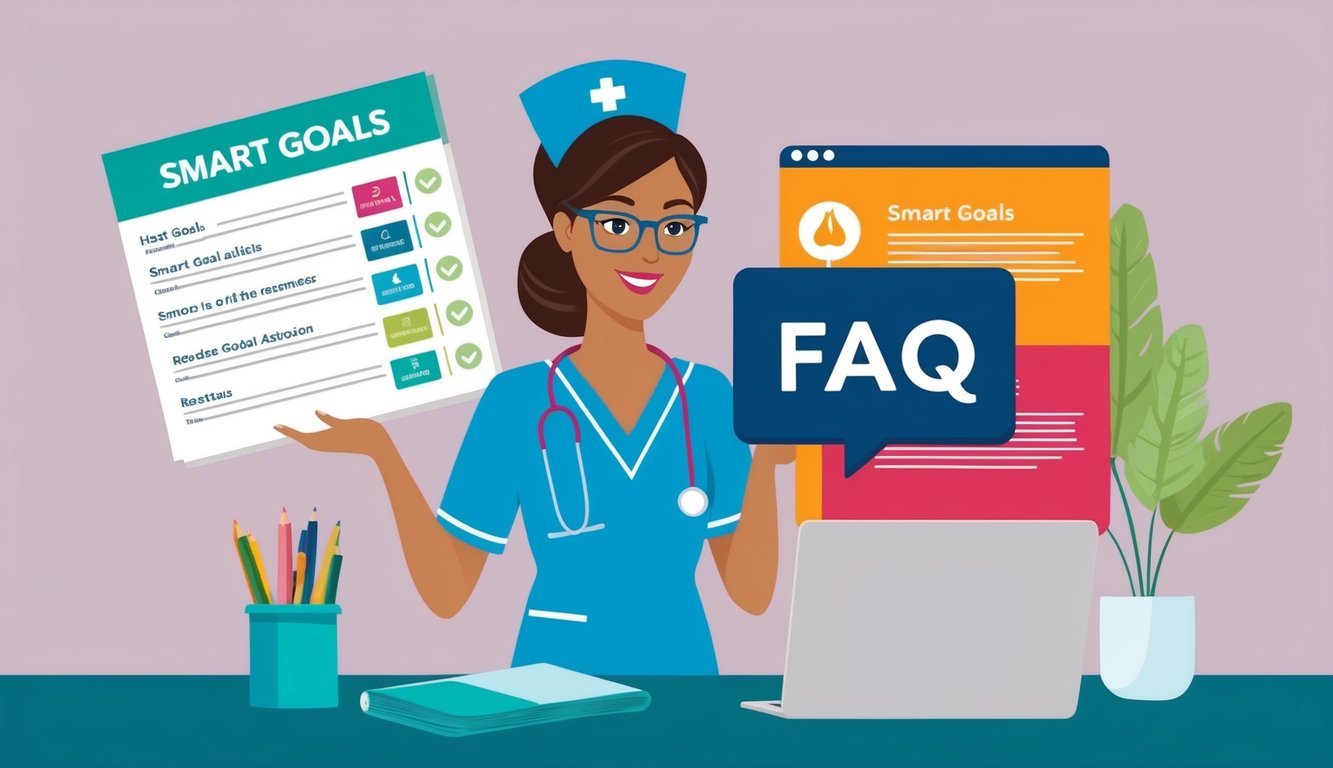SMART goals are essential tools for nurses seeking to enhance their professional practice and personal development.
By being Specific, Measurable, Achievable, Relevant, and Time-Bound, you can create clear paths to success and make significant strides in your career.
Setting effective goals can not only improve patient care but also foster a sense of accomplishment and motivation within your nursing role.
As you navigate the complexities of healthcare, applying SMART goals helps you focus on areas that need improvement.
Whether you aim to enhance your clinical skills, expand your knowledge, or contribute to your team’s efficiency, using this structured approach ensures you stay on track and progress steadily toward your ambitions.
By implementing SMART goals in various nursing roles, you can continuously assess your performance and adjust your strategies as needed.
This practice not only encourages personal accountability but also contributes to your overall growth, laying a foundation for a rewarding nursing career.
Key Takeaways
- SMART goals help you set clear and achievable nursing objectives.
- Applying this framework boosts your skills and enhances patient care.
- Regular assessment of your goals leads to continual improvement in your nursing practice.
Understanding SMART Goals in Nursing
SMART goals provide a structured approach to setting objectives in nursing.
By focusing on specific, measurable, attainable, relevant, and timely aspects, these goals help you improve both your professional development and patient care.
Here’s a deeper look at these components and their significance in nursing practice.
Components of SMART Goals
-
Specific: Goals should be clear and precise. For example, instead of saying, “I want to improve my skills,” specify, “I want to learn how to insert IVs.”
-
Measurable: There must be a way to track your progress. You can measure success by tracking how many IVs you insert each week.
-
Attainable: Set realistic goals that are achievable within your resources and skills. It’s important to challenge yourself while still being practical.
-
Relevant: Ensure the goal aligns with your career objectives. If your aim is to work in pediatrics, focus on goals that enhance your pediatric care knowledge.
-
Timely: Goals should have a timeline. For instance, “I will learn IV insertion techniques in three months.”
Importance in Nursing Practice
Setting SMART goals in nursing is crucial for both personal and professional growth.
These goals allow you to focus your efforts on critical areas of improvement.
-
Enhancing Skills: By setting specific goals, you can actively work towards enhancing your nursing skills and knowledge.
-
Improving Patient Care: SMART goals help you maintain a high standard of care. For example, a goal could be to complete a course on patient communication by a certain date to improve interactions with patients.
-
Professional Development: Measurable goals allow you to track your advancement, motivating you to reach new professional heights.
By understanding and implementing SMART goals, you ensure a structured approach that benefits your career and your patients’ wellbeing.
For more examples of SMART goals in nursing, you might consider checking resources such as RNlessons.
Setting Effective Goals for Nursing Professionals
Setting clear and structured goals is essential for nursing professionals.
It not only enhances your career but also improves patient care.
Focusing on specific objectives helps you prioritize your development and provide better service to your patients.
Identifying Professional Development Objectives
To advance in your nursing career, begin by pinpointing your professional development objectives.
Consider what skills you need to enhance or acquire.
This could include pursuing advanced certifications, attending workshops, or enrolling in online courses.
Steps to Identify Objectives:
- Self-Assessment: Reflect on your current skills and identify areas for improvement.
- Feedback: Seek input from peers and supervisors about your strengths and weaknesses.
- Research Trends: Stay updated on nursing trends to align your goals with industry needs.
These steps will help you create specific and measurable objectives that you can evaluate over time.
This focused approach makes professional development easier and more effective.
Creating Goals for Patient Care Excellence
High-quality patient care is a primary focus in nursing.
Establishing SMART goals can elevate your practice and enhance patient outcomes.
Examples of Patient Care Goals:
- Improve Communication: Aim to enhance your communication with patients by using a standardized check-in protocol within three months.
- Increase Patient Education: Set a goal to educate 90% of your patients about their medications by the end of each week.
SMART Goal Framework:
- Specific: Clearly define the goal.
- Measurable: Ensure there are criteria to track progress.
- Achievable: Make sure it’s attainable.
- Relevant: Align it with patient care needs.
- Time-Bound: Set deadlines for each goal.
By focusing on these goals, you can improve both your professional skills and the quality of care that your patients receive.
For more resources on creating effective goals, you can visit SMART Goals for Nursing.
Strategies for Achieving Nursing Goals
To successfully reach your nursing goals, you need to focus on effective time management, develop your clinical skills, and integrate feedback into your practice.
Each strategy plays a crucial role in enhancing your efficiency and ensuring you stay on track for achievement.
Time Management and Efficiency
Effective time management helps you prioritize tasks and balance various responsibilities.
Start by creating a daily schedule that outlines your key activities.
Break down larger tasks into smaller, manageable steps.
Tools like to-do lists or digital planners can enhance your organization.
Consider using techniques such as the Pomodoro Technique, which encourages working in focused bursts followed by short breaks.
This method helps maintain concentration and reduces burnout.
Additionally, setting specific time frames for completing tasks can promote accountability and efficiency.
Building Clinical and Assessment Skills
To improve your nursing skills, focus on continuous education and hands-on practice.
Regularly attend workshops, seminars, or online courses that cover relevant topics.
You can also enhance your skills through simulations or by volunteering for additional responsibilities in your workplace.
Create a personal development plan that identifies areas you’d like to improve.
For example, you might want to refine your assessment techniques or patient communication skills.
Seek opportunities to practice these skills in real-life scenarios while under supervision.
This proactive approach will help you build confidence and competence.
Incorporating Feedback and Milestones
Feedback is essential for growth.
Regularly seek input from colleagues or supervisors about your performance.
Constructive feedback helps you identify strengths and areas for improvement, allowing you to take specific actions toward your goals.
Set measurable milestones to track your progress.
For instance, aim to complete a certain number of assessments each week or receive a specific level of feedback from patients on your communication skills.
Document your achievements to maintain motivation and create a roadmap for your future growth.
Application of SMART Goals in Various Nursing Roles
Setting SMART goals helps you improve your practice, education, and career in nursing.
These goals guide you in making specific plans that lead to professional growth.
Below are applications tailored for nurse practitioners, nurse managers, and nursing students.
For Nurse Practitioners and Nurse Managers
Nurse practitioners and nurse managers benefit significantly from SMART goals.
These goals can guide practice improvement, ensuring that patient care remains effective and efficient.
Examples of SMART Goals:
- Specific: Increase patient satisfaction scores by 15% over the next six months.
- Measurable: Track feedback from patient surveys.
- Achievable: Implement weekly team meetings to discuss patient care.
- Relevant: Enhancing patient satisfaction directly impacts practice reputation.
- Time-Bound: Achieve this goal by the end of the current fiscal year.
By setting these clear targets, you can enhance leadership skills and team performance.
Additionally, focusing on continuous education and mentoring can build a more capable nursing team.
For Nursing Students
For nursing students, setting SMART goals can pave the way for academic success and practical knowledge.
These goals help you focus on essential skills needed for your future career.
Examples of SMART Goals:
- Specific: Study and pass the Pharmacology exam with a grade of 85% or higher.
- Measurable: Keep track of study hours and practice test scores.
- Achievable: Dedicate at least 10 hours each week to review coursework.
- Relevant: Understanding pharmacology is vital for nursing practice.
- Time-Bound: Accomplish this by the end of the semester.
This structure guides your studying and clinical practices, leading to better preparedness for your nursing career.
Focus on building skills, such as effective communication and patient assessment, to achieve your long-term objectives.
You can learn more about setting goals for nurses at Normal Nurse Life.
Continual Improvement and Assessment

Continual improvement and assessment are vital in nursing to enhance patient care.
This process involves diligent documentation and treatment planning, alongside the pursuit of continuous education and training.
Documentation and Treatment Planning
Effective documentation is essential in nursing.
It helps in maintaining accurate patient records, which supports treatment plans and evaluations.
Using clear and concise notes enhances communication among healthcare team members.
Consider using a standardized template for your documentation.
This can include:
| Category | Details |
|---|---|
| Patient History | Previous conditions and treatments |
| Current Medications | Dosage and administration times |
| Upcoming Assessments | Goals for the next evaluation |
Creating a comprehensive treatment plan involves setting specific objectives for patient care.
Regularly adjusting these plans based on patient progress is critical for successful outcomes.
Seeking Continuous Education and Training
Staying current with nursing practices is key to improving your skills.
Participating in nursing conferences or workshops can enhance your knowledge and adaptability.
Engaging in continuous education helps you keep up with advancements in treatments and technologies.
You might also consider:
- Online Courses: Flexible options for skill enhancement.
- Certifications: Gain expertise in specialized areas of nursing.
- Peer Feedback: Utilize evaluations from colleagues for personal growth.
These initiatives not only improve your communication skills but also boost your confidence in patient interactions.
Being proactive in your education ensures you deliver the best possible care.
For more information, visit Incredible Health for resources on nursing goals and training.
Frequently Asked Questions

SMART goals are essential for effective nursing practice.
They help you set clear, actionable objectives that can enhance patient care, professional development, and overall performance.
What are the components of SMART goals within nursing practice?
SMART goals consist of five key components:
- Specific: Clearly define what you want to achieve.
- Measurable: Establish criteria to measure your progress.
- Attainable: Ensure the goal is realistic and achievable.
- Relevant: Align the goal with your nursing practice and career.
- Time-bound: Set a deadline for reaching the goal.
How can SMART goals improve patient care in nursing?
Implementing SMART goals allows you to focus on the specific needs of patients.
For example, you can create tailored care plans that directly address individual patient concerns.
This structured approach leads to better health outcomes and improved patient satisfaction.
What is an example of a SMART goal for nursing professional development?
An example of a SMART goal could be: “I will complete a certification in critical care nursing within six months.
I will attend a series of workshops and pass the final exam.” This goal is specific, measurable, attainable, relevant, and time-bound.
How do you apply SMART goal methodology in creating nursing care plans?
To apply SMART goals in nursing care plans, begin by assessing your patient’s needs.
Set specific goals related to their health issues and outline measurable outcomes.
Then, create action steps to achieve these goals within a set time frame.
How are SMART goals used to measure nursing student performance?
SMART goals can track nursing student progress by establishing clear expectations.
You might set goals based on clinical skills, knowledge retention, or professional behavior.
Regular assessments against these goals help evaluate student performance effectively.
What role do SMART goals play in nursing leadership and management?
In nursing leadership, SMART goals facilitate strategic planning and team accountability.
Leaders can set measurable objectives for patient care quality or staff development.
This clarity helps ensure that all team members are aligned and working towards common aims.

